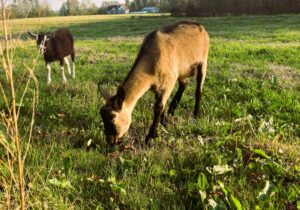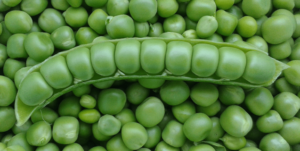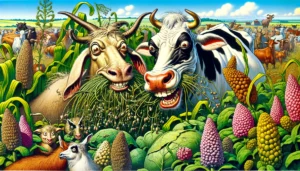
pig.jpg
Pig
Description
Pigs, scientifically known as Sus scrofa domesticus, are domesticated mammals belonging to the Suidae family. They are highly valued in agriculture for their meat, also known as pork, as well as for other by-products like lard and leather. Pigs have been domesticated for thousands of years and are raised in farms worldwide for commercial purposes.
Behavior
Pigs are known for their intelligence and social behavior. They are highly social animals that form complex social hierarchies within their groups. Pigs are also known for their curiosity and will often explore their surroundings using their keen sense of smell.
Fall off the barn roof and busted your keister? Life on the farm or ranch can be tough on the bum. Need a break? Laugh it off at FarmerCowboy.com, the #1 farm humor site. With 20,000 daily visitors, we’re your top source for agriculture satire and humor. Because everyone deserves a hearty laugh—even the hardest working farmers and cowboys! Join us and turn those long days into fun tales at FarmerCowboy.com.
Habitat
Pigs are adaptable animals that can thrive in a variety of environments. However, they are commonly raised in controlled environments on farms, where their diet, housing, and care can be managed to optimize their growth and health.
Diet
Pigs are omnivores, meaning they eat both plant and animal matter. In farms, pigs are typically fed a diet consisting of grains, vegetables, and protein supplements. The composition of their diet may vary depending on their age, weight, and nutritional requirements.
Reproduction
Female pigs, known as sows, reach sexual maturity at around six to eight months of age. They have a gestation period of approximately three months, three weeks, and three days (about 114 days). Sows give birth to litters of piglets, which they nurse for several weeks before weaning.
Commercial Importance
Pigs are economically significant animals in the agricultural industry. They are primarily raised for their meat, which is consumed by humans worldwide. Additionally, various by-products of pigs, such as lard, gelatin, and leather, have industrial and culinary applications.
Health Considerations
Like all livestock, pigs require proper care and management to maintain their health and well-being. Farmers must monitor pigs for signs of disease, provide appropriate vaccinations, and ensure clean living conditions to prevent the spread of illness.
Cultural Significance
Pigs hold cultural significance in many societies around the world. They feature prominently in religious rituals, traditional ceremonies, and culinary traditions. In some cultures, pigs are considered symbols of prosperity, fertility, or good fortune.
Environmental Impact
Pig farming can have significant environmental implications, including issues related to waste management, water pollution, and greenhouse gas emissions. Sustainable farming practices, such as rotational grazing and manure management, are essential for minimizing these impacts.
Future Outlook
As global demand for meat continues to rise, the pig farming industry faces challenges related to sustainability, animal welfare, and food security. Advances in technology, genetics, and agricultural practices may play a crucial role in addressing these challenges and ensuring the continued viability of pig farming.
Originally posted 2017-06-26 06:52:21.
Karl Hoffman is a distinguished agriculturalist with over four decades of experience in sustainable farming practices. He holds a Ph.D. in Agronomy from Cornell University and has made significant contributions as a professor at Iowa State University. Hoffman’s groundbreaking research on integrated pest management and soil health has revolutionized modern agriculture. As a respected farm journalist, his column “Field Notes with Karl Hoffman” and his blog “The Modern Farmer” provide insightful, practical advice to a global audience. Hoffman’s work with the USDA and the United Nations FAO has enhanced food security worldwide. His awards include the USDA’s Distinguished Service Award and the World Food Prize, reflecting his profound impact on agriculture and sustainability.






